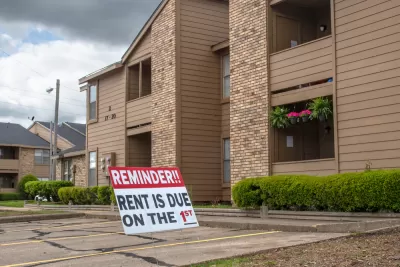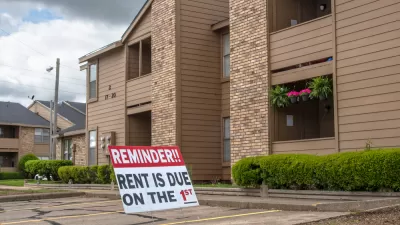The Biden administration is promising a "whole-of-government" approach to prevent an impending wave of displacement and effectively distribute rental assistance.

"The Biden administration announced today that it will extend the federal eviction moratorium issued by the Centers for Disease Control and Prevention (CDC) through July 31, and it will implement a whole-of-government approach to prevent a historic wave of evictions this summer," according to a press release from the National Low Income Housing Coalition (NLIHC). "Extending the eviction moratorium through July gives state and local governments more time to distribute more than $46 billion in emergency rental assistance (ERA) to those most in need." The CDC says the extension is intended to be the last in a series of moratoriums meant to prevent evictions during the COVID-19 pandemic.
Additional actions include:
- Convene a summit to bring together local teams to develop eviction-prevention action plans.
- Issue new guidance from Treasury for the ERA program to accelerate and broaden state and local delivery of funds.
- Have the Department of Justice send guidance to state courts encouraging them to adopt anti-eviction diversion practices.
- Provide guidance from HUD to help prevent Fair Housing Act violations related to evictions.
- Activate a whole-of-government effort to raise awareness about emergency rental assistance, tapping agencies including Treasury, HUD, CFPB, DOJ, and USDA to inform tenants and landlords of available support.
According to NLIHC, "At least 6 million renter households are still behind on rent: state and local governments must use the next month to quickly and aggressively strengthen their emergency rental assistance programs to avert an historic wave of evictions this summer and fall."

Alabama: Trump Terminates Settlements for Black Communities Harmed By Raw Sewage
Trump deemed the landmark civil rights agreement “illegal DEI and environmental justice policy.”

Study: Maui’s Plan to Convert Vacation Rentals to Long-Term Housing Could Cause Nearly $1 Billion Economic Loss
The plan would reduce visitor accommodation by 25% resulting in 1,900 jobs lost.

Planetizen Federal Action Tracker
A weekly monitor of how Trump’s orders and actions are impacting planners and planning in America.

Waymo Gets Permission to Map SF’s Market Street
If allowed to operate on the traffic-restricted street, Waymo’s autonomous taxis would have a leg up over ride-hailing competitors — and counter the city’s efforts to grow bike and pedestrian on the thoroughfare.

Parklet Symposium Highlights the Success of Shared Spaces
Parklets got a boost during the Covid-19 pandemic, when the concept was translated to outdoor dining programs that offered restaurants a lifeline during the shutdown.

Federal Homelessness Agency Places Entire Staff on Leave
The U.S. Interagency Council on Homelessness is the only federal agency dedicated to preventing and ending homelessness.
Urban Design for Planners 1: Software Tools
This six-course series explores essential urban design concepts using open source software and equips planners with the tools they need to participate fully in the urban design process.
Planning for Universal Design
Learn the tools for implementing Universal Design in planning regulations.
Caltrans
Smith Gee Studio
Institute for Housing and Urban Development Studies (IHS)
City of Grandview
Harvard GSD Executive Education
Toledo-Lucas County Plan Commissions
Salt Lake City
NYU Wagner Graduate School of Public Service





























